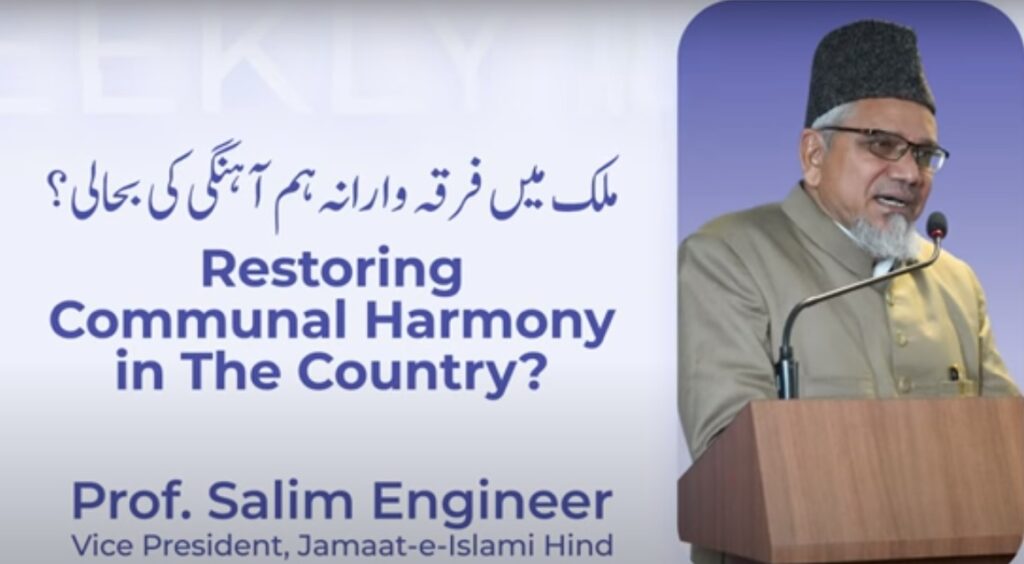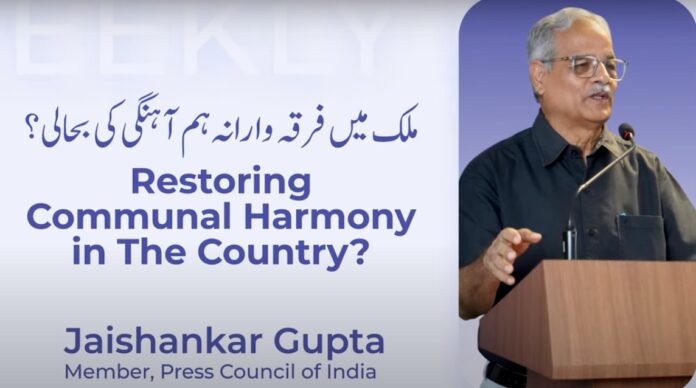India Tomorrow
NEW DELHI—Amid concerns over threats to India’s composite “Ganga-Jamuni” culture, senior journalist and Press Club of India member Jaishankar Gupta offered a candid assessment of communal harmony challenges in India, pointing out that historically, dominant ‘Manuwadi’ groups redirected attention to Hindu-Muslim conflicts to maintain dominance, a tactic rooted in colonial-era divide-and-rule policies.
Presiding over a programme on the topic of “Restoring Communal Harmony in the Country” at the Jamaat-e-Islami Hind (JIH) headquarters, JIH Vice President Prof. Salim Engineer highlighted the urgent need to restore communal harmony in India. Prof. Salim emphasized that mere discussion is no longer sufficient, concrete actions are now necessary to address the deteriorating situation.
According to Prof. Salim, the decline in communal harmony over the past decade has been unprecedented, affecting various aspects of society. He stated, “The most significant impact, the factor that has weakened our country and society the most, is the deterioration of communal harmony.”

ion of communal harmony and fraternity has been the most severe. He stressed the crucial role of the government and administration in addressing this issue, asserting that if the authorities were to decisively act against mob lynching, hate speech, and communal violence, such incidents could be effectively curbed.
Recalling a meeting with Delhi’s Police Commissioner during the communal riots in Delhi, Prof. Salim shared, “We told him that if the government decides that riots will not happen, they won’t happen. There might be 2-3 hours of disturbance, but if violence continues for days, it implies that the government wants the riots to occur.”
Prof. Salim expressed cautious optimism about recent political developments and poll results in which the opposition increased their strengths, suggesting that increased pressure on the government might lead to positive changes. However, he also noted the ideological nature of the current ruling dispensation, stating, “This government isn’t just any party’s government. It’s a government with a specific agenda and ideology aimed at steering the country in a particular direction.”
Emphasizing the critical role of society in combating communal disharmony, the JIH leader believes that despite the negative portrayal, there is still significant positivity within Indian society. “The number of people who fearlessly spread hatred, take the law into their hands, and carry out attacks is not very large,” he observed, calling for society to become more vigilant and vocal against such elements.
Prof. Salim proposed several strategies to improve communal relations, stressing the importance of inter-community engagement at all levels, including family gatherings during celebrations and times of sorrow. He asserted that understanding and respecting different communities is crucial in India’s diverse society. He added, “While adhering to one’s faith, respecting others’ beliefs, and working together on common causes and good deeds can foster unity and develop a shared agenda for societal improvement.”
The JIH Vice President summarized these strategies as “contact, dialogue, respect, cooperation, and collaborative action” (using words that all begin with ‘s’ in Hindi).
Prof. Salim also emphasized the distinction between religiosity and communalism. “Sometimes people misunderstand being religious as being fundamentalist. Living according to one’s religion, practicing its teachings, and respecting each other create values and mutual respect. Communalism, on the other hand, involves belittling others and spreading hatred,” he explained, urging people to understand and educate others about this difference.
He emphasized the increased responsibility of religious leaders in the current climate, calling for efforts to bring together spiritual leaders from different faiths. His emphasis on interfaith dialogue, mutual respect, and collaborative action provides a roadmap for fostering a more inclusive and harmonized nation.
Earlier, in a thought-provoking address on communal harmony at the JIH headquarters, senior journalist Gupta after assessing the challenges to communal harmony, proposed potential solutions to bridge divides between communities.
Gupta began by asserting that communal harmony has faced its greatest threats in recent decade and even in the entire past century. He noted that while India was once renowned for its composite “Ganga-Jamuni” culture, this syncretic tradition is now under attack from various quarters. He said, “Communal harmony is not just an issue between Hindus and Muslims. For example, in Manipur, there is no conflict between Hindus and Muslims but between the Mithai and Kukis ethnic groups of the state.”
Gupta argued that historically, conflicts here have often arisen between extremist and moderate factions within communities rather than between religions themselves. He added, “In Hinduism, reform movements led by various figures like Phule, Ambedkar, and Gandhi made efforts to integrate marginalized groups like Shudras and tribals into the mainstream. When these dominant sections or ‘Manuwadi’ people felt that they would lose their domination in society if these efforts succeeded, they redirected people’s attention towards Hindu-Muslim conflicts to maintain their supremacy.” This tactic, Gupta suggested, was not a recent invention but had roots in the colonial era when British rulers inflamed communal divisions to implement their “divide and rule” policy.
Shedding light on the communal mindset being promoted among the people of the country, Gupta opined, “A particular mentality was promoted in the country that Muslims ruled over us, suppressed us, imposed restrictions, demolished our temples, and outside Muslim invaders attacked us. Similarly, Muslims’ minds were infected with a mindset that once they were rulers here, but now they are being ruled, and efforts are being made to marginalize their community by restricting their access to education and employment.”
The speaker criticized the role of certain political and ideological groups in perpetuating negative stereotypes about Muslims, citing the Rashtriya Swayamsevak Sangh (RSS) as an organization that has consistently portrayed Muslims as the root cause of Hindus’ problems since its inception in 1925. He said, “In their ‘Shakhas’ (RSS’ local branches), they always talk about Babar, Taimur, Nadir Shah, etc., and propagate that these invaders attacked us.”
Talking about the historical battles, the speaker said, “RSS does not show the real history that mostly Muslim invaders attacked Muslim rulers of India of their times, not Hindu rulers. For example, Babar first attacked Ibrahim Lodhi, and when Babar fought Rana Sanga, Hasan Khan Mewati sided with Rana Sanga against Babar, which is overlooked.”
Expressing disappointment with the current political climate, where he believes communal tensions are being stoked for electoral gains, Gupta criticized the lack of substantive policy discussions on education, foreign affairs, and economic issues, arguing that some political actors rely on maintaining Hindu-Muslim animosity to sustain their relevance.
Praising recent electoral outcomes in the country and especially in Uttar Pradesh as a sign that voters are growing weary of divisive politics and unfulfilled promises, the journalist suggested that after a decade of religious polarization, people are increasingly concerned about practical issues like unemployment, corruption, and economic hardship.
Turning to the media’s role, Gupta offered a scathing critique of sensationalist reporting practices. He recounted instances where editors deliberately sought to inject communal angles into stories to boost ratings, even when such elements were not inherently part of the news event. This approach, he argued, contributes to the deterioration of inter-community relations and distorts public perceptions.
The senior journalist called for a return to responsible journalism that prioritizes facts over sensationalism and promotes understanding between communities. He urged media outlets to resist the temptation to frame every story through a communal lens and instead focus on issues that affect all citizens regardless of their religious background.
Proposing several measures to restore and strengthen communal harmony, Gupta suggested the need to increase inter-community dialogue and social interactions to break down barriers of mistrust. He also stressed the importance of encouraging individuals to expand their social circles to include friends from diverse religious backgrounds. He emphasized promoting mutual respect for different religious beliefs while maintaining the right to practice and take pride in one’s own faith, and combating superstition and extremism within religious communities through education and rational discourse. He suggested avoiding religious gatherings that promote hate speech or incite violence against other communities, rejecting politicians and organizations that exploit religious sentiments for political gain, and promoting a more inclusive understanding of history that acknowledges the contributions and shared heritage of all communities in India.
Gupta emphasized the need for these principles to be put into practice rather than remaining mere rhetoric. He called on both Hindu and Muslim communities to recognize their shared history and reject narratives that portray entire groups as foreign invaders or oppressors.
The senior journalist concluded by expressing cautious optimism about recent political developments, suggesting that voters are beginning to prioritize governance and development over divisive religious politics. He called on citizens to build on this momentum and work collectively to foster a more harmonious and inclusive society.





